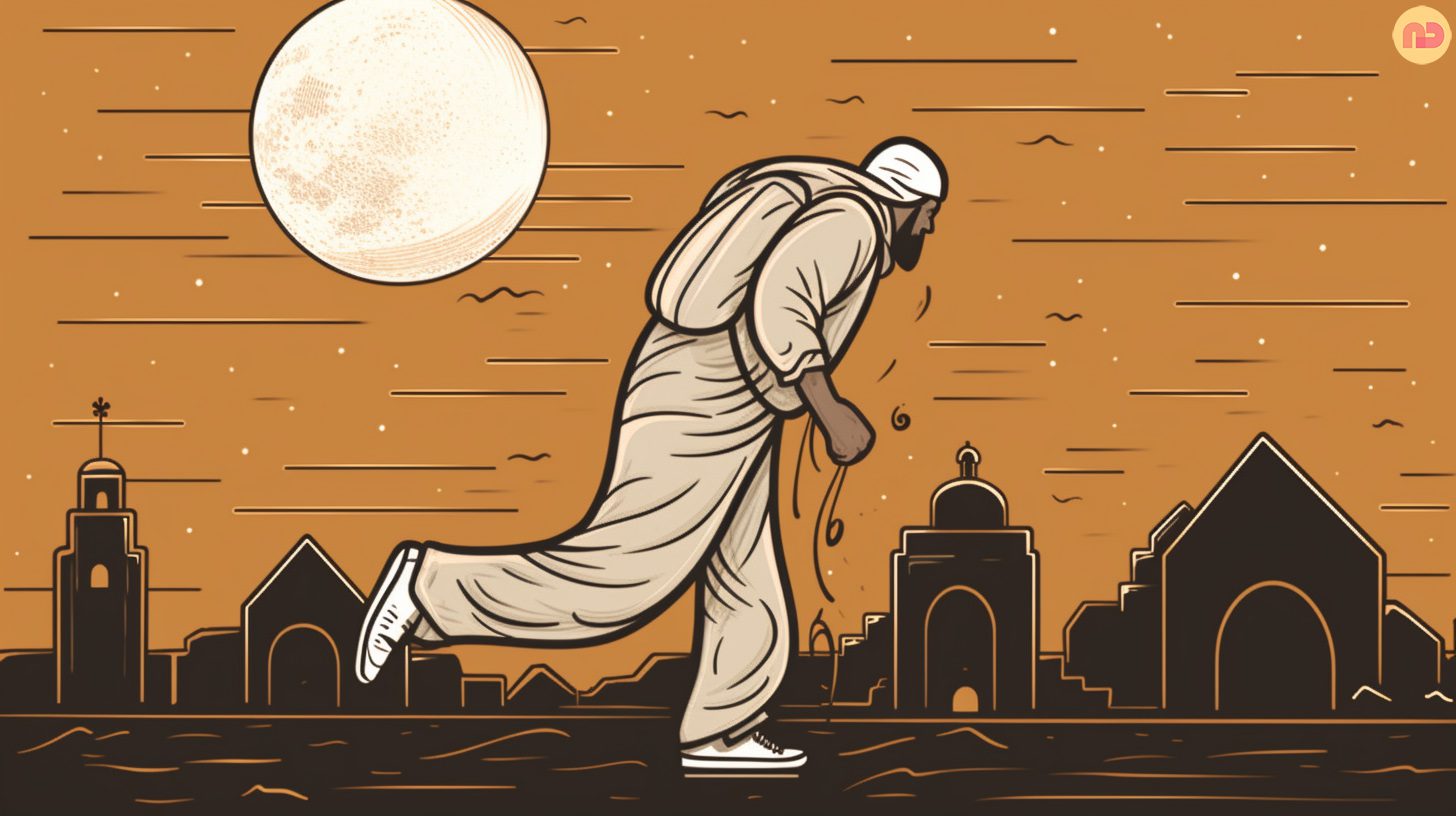Discovering the surprising effects of fasting on blood sugar levels during Ramadan
My Experience with Blood Sugar Levels During Ramadan
It’s as if my years have become a blur. The days blend together like the vibrant watercolours in a painting by Claude Monet. Looking back on the past few years, life has been speeding, and I’ve struggled to keep up.
As if I’m playing a game where the rules keep changing, and I can’t seem to get a grip. Can you relate? This year, the holy month of Ramadan’s arrival caught me by surprise. I found myself facing a new set of challenges. Yet, despite the long fasting days, from 5:16am to 7:32pm, I felt okay.
In the past, my training regimen had been nothing short of intense, and I took pride in pushing myself to the limit. Hours before breaking my fast, I would run, do callisthenics, engage in high-intensity interval training, yoga, strength and conditioning, and more.
I still felt energised and ready to take on the world. But this year, something shifted. After breaking my fast, instead of feeling invigorated, I was hit with an overwhelming sense of weakness and fatigue that left me longing for nothing more than a deep, uninterrupted sleep.

At first, I chalked it up to getting older (father time), but this feeling persisted. Refusing to subside no matter how much I tried to ignore it. And it wasn’t just the fatigue that was plaguing me. For a month, I began to experience bizarre, out-of-body sensations that left me feeling like I was losing control.
Something was off, but I couldn’t quite grasp it. It was as though my body was betraying me, leaving me feeling strange and unsettled. As the days passed, the feeling grew stronger after breaking my fast. Then, over a month, things began to take a turn for the worse on several occasions, leaving me feeling helpless and confused.
This year’s Ramadan coincided with my newfound love for walking. It’s a ritual I’ve come to cherish – breaking my fast, waiting for a while, and then taking an hour-long stroll. Unfortunately, however, since the start of Ramadan, I’ve experienced dizziness and light-headedness on more than ten occasions.
As I set out for my walk, a wave of unsteadiness would wash over me, leaving me disoriented and vulnerable. Finally, my vision became blurry, and sudden dizziness wavered over me. Threatening to send me collapsing to the ground. I struggled to control my legs and body, feeling lightheaded and disoriented.
As I experience these episodes, I become increasingly self-conscious about how I look to others. It’s as if I’m trying to maintain a façade of wellness, all while battling waves of hot flushes and fatigue. When I finally regain control of my body, I check my Garmin smartwatch for any warning signs in my vitals.
Surprisingly, during these weird episodes, my heart rate was low, oxygen levels were normal, and even my breathing was steady. It was as if my body was betraying me, causing my pace to slow dramatically. But, like an Olympic race walker, I’m known for maintaining a high speed. So I was on a mission to win gold if you saw me.
During the fast, I maintain two walks a day of 4km, with a steady pace of 9 minutes and 30 seconds per kilometre. This ensures that I don’t use up all the fluid in my body before breaking my fast and avoid breaking into a sweat. However, during my uncomfortable night walks, my pace drops to around 10 minutes and 40 seconds per kilometre after breaking my fast.
It wasn’t until after the first five occurrences that it dawned on me that my blood sugar levels during Ramadan could be the culprit, teaching me a lesson on how not to break my fast. Since my enlightenment, I have been on a mission to keep my body in check and maintain my Olympic-level pace.

Decoding Blood Sugar Levels During Ramadan
Feeling weak and lightheaded after breaking a fast is not uncommon during Ramadan. This is primarily during the first few days or weeks as the body adjusts. Considering I have never had anything like this, it is indicated that my blood sugar levels during Ramadan were the culprit.
My worry at first was that I had possibly developed diabetes. But I quickly ruled this out. I am a very fit and healthy individual guy, at 45 years, have a fitness age of a 20-year-old. So one possible reason I felt weak and lightheaded after breaking my fast was most likely related to changes in blood sugar levels.
When you fast, your body uses stored glucose as an energy source. So, after breaking your fast, you may experience a sudden spike in blood sugar levels. Especially someone like me that has a sweet tooth. Therefore, this can cause feelings of weakness, light-headedness, and drowsiness.
Another possible reason for my symptoms could be dehydration. During Ramadan, as you go long periods without water, your body may be in deficit. Dehydration can cause feelings of weakness, fatigue, and dizziness, which can be especially dangerous during physical activities like running or walking.
Advice on Handling Blood Sugar Levels During Fasting
While I consider myself to be a talented young man. I would 100% admit that medical advice is outside my wheelhouse of proficiency. That said, if you are looking for general guidance on handling blood sugar levels during Ramadan or fasting, here are a few tips:
Choose Healthy Foods:
During non-fasting hours, focus on eating a balanced diet with plenty of whole grains, fruits, vegetables, lean protein, and healthy fats. Avoid carbohydrates and sugary and processed foods in your first meal after fasting. They can cause your blood sugar levels to spike and crash.
Instead, choose foods high in protein and healthy fats, such as eggs, cheese, nuts, seeds, avocado, fish, or meat. These foods will help stabilise your blood sugar levels and keep you feeling full longer.
Stay Hydrated:
Dehydration can exacerbate symptoms of low blood sugar. Drink plenty of water and fluids that contain electrolytes during non-fasting hours to stay hydrated.
Fasting can cause dehydration and electrolyte imbalance, contributing to dizziness and fatigue. Avoid caffeinated or alcoholic drinks, as they can dehydrate you further.
Break Your Fast Gradually:
When it’s time to break your fast, start with a small, nutrient-dense snack like dates, fruit, or nuts, and wait 15-30 minutes before eating a larger meal. This can help prevent a sudden spike in blood sugar levels during Ramadan.
Eating smaller portions and chewing slowly can help. Your stomach may have shrunk during fasting, and your digestive enzymes may be reduced. Overeating or fast can cause stomach pain, nausea, bloating, or diarrhoea.

Monitor Your Blood Sugar Levels:
Suppose you have diabetes or other medical conditions that affect your blood sugar levels. In that case, it’s essential to monitor them regularly during fasting.
Talk to your doctor about the best way to do this and what levels to aim for.
Be Mindful of Your Body:
Pay attention to how your body feels during fasting and adjust your routine accordingly. For example, if you experience symptoms of low blood sugar, like dizziness, weakness, or nausea, take a break and rest.
Exercise Wisely:
Wait at least an hour before exercising or walking. Your body needs time to adjust to eating again and replenish its energy stores.
Exercising too soon after breaking your fast can cause hypoglycaemia or low blood sugar levels, especially if you are on medication for diabetes.
Consult a Medical Professional About Blood Sugar Levels During Ramadan:
I recommend consulting with a medical professional, especially if you continue to experience these symptoms. They can help determine the underlying cause and provide personalised advice on managing your symptoms during Ramadan.
Remember that everyone’s body is different, and what works for one person may not work for another. Therefore, it’s essential to listen to your body, consult with a healthcare professional, and make adjustments to stay healthy during fasting and manage your blood sugar levels during Ramadan.
Enjoy the last few days of Ramadan!
Sources
- Helen West, (6 February 2023). ‘How to Fast Safely: 10 Helpful Tips’, Healthline. [Accessed 18 April 2023]
- Ketogenic, (17 January 2023). ‘Breaking a Fast: How To Properly Break a Long-Term Fast’ Ketogenic. [Accessed 18 April 2023]
- Lyssandra Guerra, (28 October 2022). ‘How to Break a Fast’, wikiHow. [Accessed 18 April 2023]
- Megan Ramos, (3 June 2022). ‘How to break your fast’, Det Doctor. [Accessed 18 April 2023]


